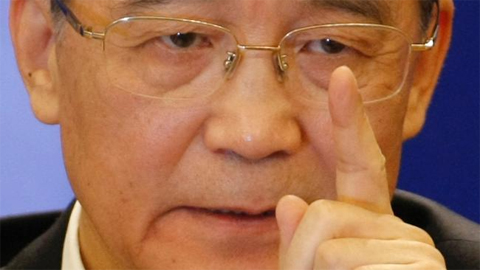

China’s monetary tightening in 2011 may be mainly in the first half as officials tackle the fastest inflation in more than two years, JPMorgan Chase & Co. and Morgan Stanley said.
The People’s Bank of China increased key one-year lending and deposit rates by 25 basis points on Christmas Day in its second move since mid-October. The change took effect yesterday. China’s stocks fell, erasing earlier gains, on speculation the central bank will accelerate increases in interest rates. Bonds dropped and yuan forwards climbed.
Premier Wen Jiabao‘s government aims to limit asset bubbles in the real-estate market and prevent rising prices from leading to social unrest after flooding the economy with cash from late 2008 to drive a recovery. Officials may keep raising interest rates and banks’ reserve requirements, sell bills to soak up cash and allow more gains by the yuan against the dollar, according to JPMorgan.
“These policy moves could be front-loaded in coming months, as headline inflation figures remain high and economic growth faces overheating risks early next year,” said Wang Qian, the brokerage’s Hong Kong-based chief China economist.
Chinese industrial companies’ profits rose 49.4 percent in the 11 months through November from a year earlier, a report showed today. That compared with a 7.8 percent gain in the same period in 2009.
Rate Increases
The benchmark lending rate rose to 5.81 percent, compared with 7.47 percent before cuts from late 2008 to counter the global financial crisis. It will climb to 6.56 percent by the end of next year, according to the median forecast in a Bloomberg News survey of economists this month.
The deposit rate increased to 2.75 percent, compared with the 5.1 percent annual pace of inflation in November.
China may raise rates as many as three times in the first half of next year, according to Morgan Stanley, while JPMorgan forecasts two increases in that period.
Officials have raised bank reserve ratios six times this year and trimmed loan growth from record levels. They scrapped the yuan’s almost two-year peg to the dollar in June as part of winding down crisis policies. Since then, the currency has gained about 3 percent.
The benchmark Shanghai Composite Index declined 1.9 percent to 2,781.40 at close, the lowest since Oct. 8. Twelve-month non- deliverable yuan forwards strengthened 0.4 percent to 6.4765 per dollar as of 3:34 p.m. in Hong Kong, reflecting bets the currency will strengthen 2.4 percent in one year, according to data compiled by Bloomberg. The contracts touched 6.4740, the highest level since Nov. 23.
Rising Yield
The yield on the 3.67 percent note due October 2020 climbed nine basis points to 3.90 percent, according to the China Interbank Bond Market.
Wen said yesterday that “inflation expectations are more dire than inflation itself” and urged people to remain confident, the state-run Xinhua News Agency reported. The government can keep prices at a reasonable level through measures such as boosting agricultural output, he said in a radio broadcast, according to Xinhua.
A central bank survey this quarter showed consumers more concerned about inflation than at any time in the past decade as their savings lose value and companies such as McDonald’s Corp.push up prices for everyday purchases.
Consumer prices rose 5.1 percent in November from a year earlier, the most in 28 months, mainly driven by food costs. Across 70 major cities, property prices climbed 7.7 percent.
‘Running Wild’
“All indications are that inflation expectations are running wild in China,” Frederic Neumann, a Hong Kong-based economist at HSBC Holdings Plc, said in an interview with Bloomberg Television today. “The government will stamp up here and try to dampen price pressures, particularly in the early months of next year by tightening monetary policy and sending a signal that they will not tolerate further price increases.”
China’s latest rate increase may precede a year in which emerging-market central banks break away from their counterparts in the industrial world by tightening monetary policy.
Morgan Stanley economists forecast a period of “polarizing policy paths” as officials from China to Brazil become increasingly confident that they can and should raise rates because of robust growth and accelerating inflation. At the same time, the Federal Reserve, the European Central Bank and the Bank of Japan will leave their benchmarks on hold throughout the year to bolster sluggish recoveries, they say.
The Morgan Stanley analysts predict 17 of 23 emerging nations they monitor will lift rates in 2011 including Brazil, China and India.
‘Center of Gravity’
The likely policy split illustrates how the economic “center of gravity” is shifting toward emerging nations, said David Cohen, an economist at Action Economics Ltd. in Singapore.
HSBC Holdings Plc economist Qu Hongbin said Dec. 25 that he expects “more hikes in both interest rates and reserve ratios in the coming months” in China.
In contrast, Fed policy makers this month renewed a pledge for an “extended period” of low interest rates and affirmed a plan to buy $600 billion of bonds through June, as part of efforts to spur growth and reduce unemployment.
China is tightening after a record expansion of credit to counter the effects of the world financial crisis. The broadest measure of money supply, M2, has surged by 55 percent over the past two years and outstanding yuan-denominated loans have climbed 60 percent to 47.4 trillion yuan.
The nation needs “a slowdown in money and credit growth in order to bring inflation fully under control,” Goldman Sachs Group Inc. analysts Song Yu and Helen Qiao said in a note. “The balancing act of keeping growth high and inflation low is leaning increasingly towards the latter.”
China’s economy may expand 9.6 percent in 2011, the International Monetary Fund estimated in October. That compared with estimates that U.S. growth will be 2.3 percent and the euro area expansion will be 1.5 percent.
—Li Yanping, with assistance from Simon Kennedy, Zheng Lifei, Judy Chen, Zhang Shidongand Deirdre Bolton. Editors: Paul Panckhurst, Allen Wan.
To contact the editor responsible for this story: Chris Anstey at canstey@bloomberg.net
Source: www.bloomberg.com







